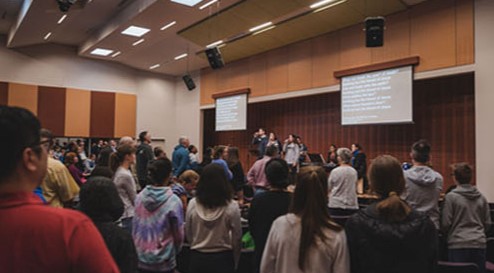- Tags:
- Congregational Update
AUDIO RECORDING

WRITTEN TRANSCRIPT
The Good of Being Connected
Presbytery’s decision on our elders’ election
At our meeting on December the first, Session received Presbytery’s response to our request that we be allowed to continue with the election of Al Green even though he had not been a member for twelve months.
Presbytery has advised that we cannot not waive the 12 month membership requirement for eldership eligibility. While understanding our situation and being grateful for well qualified men offering to serve as elders, they gave this advice because it is not in Presbytery’s power to alter a rule of the Code. These can only be varied by the Assembly.
Their advice was also that we proceed with the election of one elder now and one elder in twelve months’ time when the eligibility period will have been met. Session has resolved to follow this advice and proceed with Ross Dawson’s election in February when we are past the Christmas and holiday season, and, Lord willing, with Al Green’s election in November.
How do you react to Presbytery’s advice?
Do you think we need elders, we have well qualified nominees, and this is just a human rule – and so we should go ahead regardless? Or perhaps you think this shows that it is better for congregations to be independent of other bodies, and to just govern their own life by common sense and doing what is best for the congregation.
The importance of the local congregation
I am fully committed to the importance and priority of the local congregation. It is the gathering of believers spoken of most often in the New Testament. It is the congregation that is central to making disciples in a community, supporting and encouraging each other in evangelism and having a key role in discipling believers at every stage of life, the place where all our Lord taught is preserved and passed on, and where we can encourage and admonish each other to persevere in faith. Congregations are the temple of the Holy Spirit [1 Cor. 3:16] and the body of Christ [1 Cor. 12:27]. Their holiness, faithfulness and good order are fundamental, and matter to Christ [Rev. 2 and 3].
But Presbytery’s decision is an opportunity for me to speak of the good of what I call connectionalism, in being connected with like minded congregations in ways that can support the health and faithfulness of each congregation’s life, even if at times the cost of that is some delay in our plans or having aspects of our life governed by denominational rules.
Four Goods of Being Connected
There are at least four goods that being connected to other like minded congregations gives to our congregation.
The first good is that it reminds us of reality.
We as believers are not on our own. We are part of something bigger, a gospel movement that stretches across centuries and continents. Denominational participation is a very real way of keeping us conscious of that reality and reminding us that we have an obligation to love not just the believers known personally to us but all believers in our Lord Jesus. The collection Paul was making in the churches in Greece was for believers in Jerusalem, believers the new Christians in Macedonia and Corinth had never met personally [2 Cor. 8-9, Romans 15:25-29] and who were culturally and racially different from them. Denominational participation engages us with those who share a common faith but are distant from us, and culturally diverse. It reminds us that the important thing believers have in common is not geography, language, or culture – but a shared faith, which binds us together across the ages and spaces, and it creates one avenue to show our love for Jesus’ people who are distant from us.
The second good, denominational participation gives us is accountability outside of our own congregation.
In our case we are accountable to Presbytery both for our faithfulness to the Scriptures, our supreme standard, in what is taught in the congregation and for the good order of our life together. That is a good thing, providing opportunities for those who are concerned about what is being taught or who are mistreated, especially by leadership, to appeal to an authority outside the congregation. History teaches us that leadership can go astray – whether in doctrine or in leadership culture that can open the door to bullying and abuse. Congregations can go astray in doctrine and godliness [e.g. Rev. 2:12-29] as well as developing at times unhealthy patterns of engaging with leadership that makes gospel ministry difficult. Accountability to and oversight by Presbytery can help prevent those destructive patterns developing or provide an avenue to correct them when necessary.
The third good being connected to other congregations gives us is the benefit of accumulated wisdom in ordering our life together.
That is how our Code can be understood – the accumulated wisdom of many years and much congregational experience being brought to bear on how we run our life together. We don’t have to keep coming to every process anew, to keep re-inventing the wheel, and having clear guidelines and articulated processes, whether about elder’s elections, calling a minister, managing finances, makes life easier, more transparent, and more accountable – at least when we remember them. They contribute to our peace and good order and help prevent abuse, whether of property or power. The rule about those nominated to be elders requiring membership for twelve months is a case in point. Congregations should have an opportunity to know the character of a person being elected to eldership and should not have those they are unfamiliar with, no matter how talented or persuasive, occupy positions of leadership. Having a congregation feel that someone is being pushed upon them whom they do not know is a recipe for instability and resentment. In our case because of the confusion sown by me about membership we conformed to the spirit of this law but not the letter, and we accept that good order requires that the law, the rules, be stable across all congregations and not constantly being adapted to individual circumstances.
The fourth and final good being connected to other like minded congregations is that the structure of connection, the denominational structure, can work as a service organisation to facilitate activities needed by congregations but which are beyond the resources of individual congregations.
Examples of this, from which we have benefited, are the running of theological colleges to provide ministers committed to the doctrinal standards that are the basis of our fellowship with each other and, in their commitment to Scripture’s teaching, the foundation of the health of our common life; the provision of resources for the purchase of property and buildings for new congregations; help with compliance in employment laws, like the provision of long service leave, or in the arrangement of insurance; providing us through our Safe Church office with the guidelines and personnel that are necessary to operate in a child safe way. There are a whole range of necessary activities that connection with like minded congregations provides and for which we can be grateful.
One of my theological teachers, Dr Broughton Knox, said “independency is not a Christian concept” for it is not consistent with Christian love. He spoke the truth. Connectionalism is helpful to us and a way of helping other believers, and so should be cheerfully supported. That means working in the denomination, and with the denomination, and accepting some of the constraints of that not as impediments but as a contribution to the common good.
RECENT POSTS





